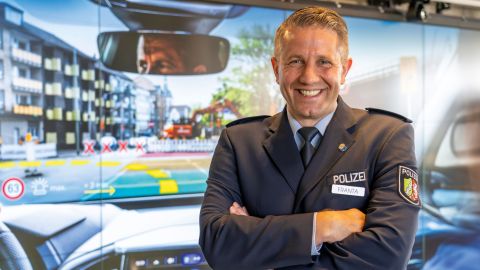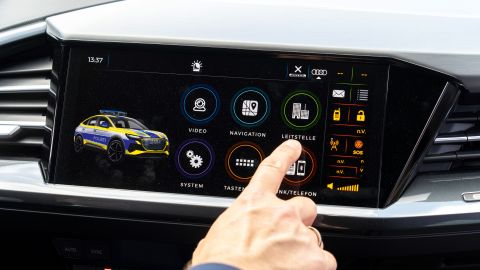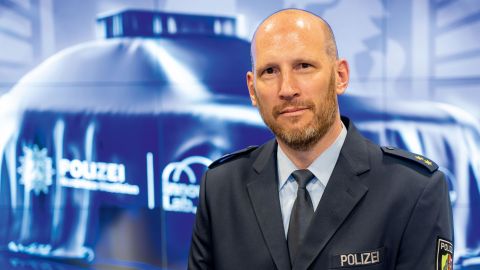At first glance, the patrol car of the future presented by the Innovation Lab of the State Office for Central Police Services NRW (LZPD) at the beginning of June does not look as futuristic as you might imagine. It is an electric vehicle (Audi Q4 e-tron) with eye-catching wrapping that includes a tactile police star. The blue light, a massive bar containing LEDs, sensors and a total of eleven cameras, cannot be overlooked. However, as with people, the same applies to this concept vehicle: what counts are the inner values - in this case: the special technology installed.
The vehicle in question comes in silver, blue and neon yellow. "It's a test object on four wheels, not an operational police vehicle," explains Dominic Reese, Head of the Innovation Lab at the LZPD. In the think tank, which is located not far from Duisburg city center, the NRW police have been working on new, intelligent deployment technology and modern equipment for one and a half years. The new patrol car is not a finished product that police officers will soon be taking out on their missions. Rather, further research will be carried out on and with the model in the coming months and years. The built-in sensor technology with cameras and infrared sensors alone weighs 25 kilograms.
"This car serves as a technology carrier to test new, innovative application technology. Our aim from the outset was to merge police IT worlds with the vehicle," says Thomas Franta, Head of Division at LZPD NRW, who is responsible for vehicle technology and automotive IT. But one thing is already clear: The technologies installed in the "guinea pig" give a foretaste of the police work of the future - and may have an impact far beyond the actual vehicle.
In addition to the all-electric drive, there are three technologies in particular that allow the prototype to shift up a gear. Three new technologies that are intended to increase the safety and capabilities of officers in the field:
- An on-board computer, which is connected to the respective control center and the duty cell phone, creates the bridge between police IT and vehicle IT. Dominic Reese on the new "brain" of the car, which in reality is a small module that fits in the trunk: "It provides police officers with information about the operation in real time." According to the senior police officer, this can already be important for assessing the situation on the journey: What is currently happening at the scene? Are there already indications of danger? Are people on the run? How are the people described? In which direction have they fled?
- Car Play. The Audi's large screen and touchscreen not only display all the information that can help the police "get ahead of the situation", as NRW Interior Minister Herbert Reul put it at the presentation of the vehicle. There are also the apps that NRW police officers already use on the 36,000 or so service cell phones issued to them. In this way, functionalities that have already been learned can also be used in the car without any problems. And: "Of course, it is easier and more realistic to develop a new app for a special application than for the car manufacturer to build a new user interface for us," emphasizes Thomas Franta.
- The "sensor-based blue light" with integrated video surveillance comes from a Swiss company. It is already approved in this form in the neighboring country. Thanks to its built-in sensors and cameras, it offers a whole new range of possible applications. "We can take speed measurements from the car, detect the distance between vehicles in several lanes while driving and, in future, use AI to check whether someone is on their cell phone or not wearing a seatbelt," says Franta, listing a few examples. The video data will be analyzed by computer in the patrol car.
For the NRW police, it's all about preparing police officers for the challenges of the future - for whatever comes next. "And in the best possible way," said Interior Minister Reul at the meeting in Duisburg. The digital high-tech patrol car, which in this version costs around 90,000 euros (technology) plus 60,000 euros (car), is one component. This model alone will make work processes easier for officers if, for example, some of the paperwork can be completed even more user-friendly and quickly in the vehicle in future. The upcoming test phase will show which of the smart technologies could become part of a patrol car's permanent inventory in five, ten or fifteen years' time.
The Innovation Lab and its colleagues throughout the NRW police force have their sights firmly set on the future beyond patrol cars. "It is very clear that we not only need to digitalize our processes, but also adapt them to the digital world," says Dominic Reese, setting the direction. Networking is not only changing the technology in patrol duty, but the entire job, i.e. police work as a whole. Reese is certain: "Our primary goal is to offer officers a good and safe workplace and to simplify their job. The experience gained with the new vehicle will make a significant contribution to achieving this."


